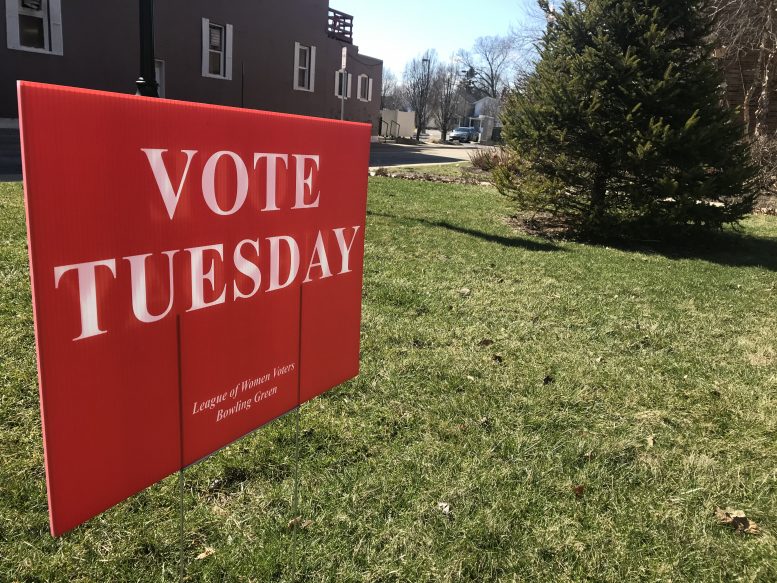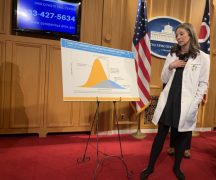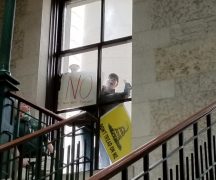Days after the Ohio Primary Election was postponed, it is still unclear how (or when) voting will proceed.
Despite that, Ohio Secretary of State Frank LaRose is not waiting on the courts or the legislature to decide. LaRose has announced a new June 2 voting date on his official government website.
Not only that, but LaRose is already dictating the rules 88 county boards of elections should follow. Among them: that county boards not accept any new voter registrations ahead of the theoretical, not-yet-official June 2 election.
The Secretary of State’s office provided a unique defense for pronouncing a new date: LaRose isn’t rescheduling the election, he’s only extending it.
“The Governor and Secretary took the necessary actions (on March 16) to keep Ohioans safe and protect the integrity of our democracy by extending the March 17th election so voters can safely have their voices heard,” spokesperson Maggie Sheehan told the Capital Journal. “Despite any inference to the contrary, the election has not been rescheduled, it has been extended.”
It is unclear if this distinction offered by LaRose’s office (rescheduled vs. extended) carries any weight. The reality is that the election status is in limbo. LaRose does not have legal authority to determine Ohio’s election dates. They are set by the state legislature.
His directive to the county boards of elections has garnered swift criticism from a number of voting rights groups in the state. They believe a new election date should reopen the permitted time period of new registrations.

The conflict
In Ohio, eligible residents must register to vote 30 days prior to a given election in order to cast a ballot.
The primary election was scheduled for March 17, meaning the deadline for new registrations was Feb. 18.
This is where things get hairy. In the intervening weeks, Ohio Gov. Mike DeWine and Ohio Department of Health Director Amy Acton issued a number of orders and closures meant to stop the spread of COVID-19. Among them: that mass gatherings of 100 people (later reduced to 50) are prohibited.
On March 16, the day before the primary, the Centers for Disease Control recommended even tougher restrictions: that gatherings be limited to just 10 or fewer people.
To DeWine and LaRose, it became apparent that hosting an election the next day — with crowded polls in a presidential year — was not a good thing to do.
Thus began a very long day in which state officials tried, then ordered the election not take place. They initially failed in the courts when a Franklin County judge refused to step in just 12 hours before polls were set to open.
There were rumblings of a late-night appeal or convening an emergency session of the Ohio General Assembly. In the end, Acton decided to order the polls closed as a health emergency.
How to move forward?
Now comes the matter of how to proceed with the election. Weeks of early voting and absentee balloting have already occurred. LaRose and DeWine want there to be extended absentee voting and an eventual June 2 voting date.
That is what LaRose is already announcing will happen, despite technically not having the legal authority to decide that.
The Ohio Revised Code reads: “In years in which a presidential primary election is held, all primary elections shall be held on the third Tuesday after the first Monday in March …”
The Ohio Senate and the Ohio House of Representatives are not scheduled to reconvene until later in March. In the meantime, the Ohio Democrats have filed a lawsuit with the Ohio Supreme Court challenging LaRose’s order.
‘Uncharted territory’
On Thursday, LaRose received a critical letter sent jointly by the League of Women Voters of Ohio, the A. Philip Randolph Institute of Ohio, the ACLU of Ohio, the Lawyers Committee on Civil Rights and a voting reform group known as Demos.
The groups point to Ohio law allowing registration up to 30 days before an election, as well as the National Voter Registration Act, a federal law similarly setting registration deadline 30 days before a federal election (in this case, the presidential primary).
In LaRose’s view, June 2 would not be its own election date, but merely an extension from the postponed March 17 date. Thus, the February registration deadline still applies even to an election being held in June.
In an appearance on CNN, LaRose was questioned about the Monday night sequence of pursuing a health emergency rather than appealing the judge’s decision in the courts.
“I’m not an attorney,” LaRose noted.
The letter from voting rights groups argues that registration law should be followed even amid a public health crisis.
“Yes, in many ways we are in uncharted territory,” wrote Freda Levenson, the legal director for the ACLU of Ohio. “But neither the global pandemic, nor the fact that the election date is changed, means that we need to devolve into anarchy. The national and state laws that protect the rights of Ohio voters are still in effect, and must be followed.”
Jen Miller, executive director of the League of Women Voters of Ohio, stressed that they believed the decision to postpone the election was a wise decision. However, it is the reaction to that postponement that is under scrutiny.
“We agree that postponing the election helped protect the health and safety of Ohio voters and poll workers,” stated Jen Miller, Executive Director of the League of Women Voters of Ohio. “Having an accurate, up-to-date registration is the first step for casting a ballot, so voters must be granted the same registration schedule as every other election.”





